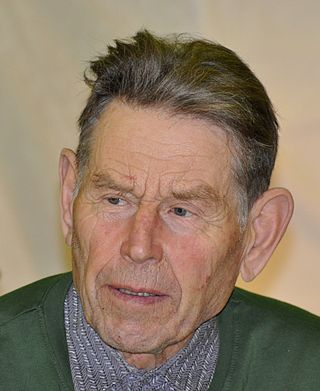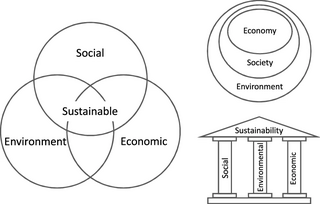
Left-wing politics describes the range of political ideologies that support and seek to achieve social equality and egalitarianism, often in opposition to social hierarchy as a whole or certain social hierarchies. Left-wing politics typically involve a concern for those in society whom its adherents perceive as disadvantaged relative to others as well as a belief that there are unjustified inequalities that need to be reduced or abolished through radical means that change the nature of the society they are implemented in. According to emeritus professor of economics Barry Clark, supporters of left-wing politics "claim that human development flourishes when individuals engage in cooperative, mutually respectful relations that can thrive only when excessive differences in status, power, and wealth are eliminated."
Green anarchism, also known as ecological anarchism or eco-anarchism, is an anarchist school of thought that focuses on ecology and environmental issues. It is an anti-capitalist and anti-authoritarian form of radical environmentalism, which emphasises social organization, freedom and self-fulfillment.
Green politics, or ecopolitics, is a political ideology that aims to foster an ecologically sustainable society often, but not always, rooted in environmentalism, nonviolence, social justice and grassroots democracy. It began taking shape in the western world in the 1970s; since then green parties have developed and established themselves in many countries around the globe and have achieved some electoral success.
Eco-capitalism, also known as environmental capitalism or (sometimes) green capitalism, is the view that capital exists in nature as "natural capital" on which all wealth depends. Therefore, governments should use market-based policy-instruments to resolve environmental problems.

Kaarlo Pentti Linkola was a prominent Finnish deep ecologist, ornithologist, polemicist, naturalist, writer, and fisherman. He wrote widely about his ideas and in Finland was a prominent thinker, and is linked by some authors to ecofascism and to authoritarian deep ecology. Linkola was a year-round fisherman from 1959 to 1995. He fished on Keitele, Päijänne and the Gulf of Finland, and since 1978 he fished on Vanajavesi.
Ecofascism is a term used to describe individuals and groups which combine environmentalism with fascism.

Joel Stephen Kovel was an American scholar and author known as a founder of eco-socialism. Kovel became a psychoanalyst, but he abandoned psychoanalysis in 1985.
Eco-nationalism is a synthesis of nationalism and green politics. Eco-nationalists may be from many points across the left–right political spectrum, but all are bound to the idea that the nation-state and its citizens have a special duty to protect the environment of their country.

Liberal democracy, Western-style democracy, or substantive democracy is a form of government that combines the organization of a representative democracy with ideas of liberal political philosophy.
Green conservatism is a combination of conservatism with environmentalism. Environmental concern has been voiced by both conservative politicians and philosophers throughout the history of conservatism. One of the of most prominent early philosophers of conservatism, Edmund Burke, in his Reflections on the Revolution in France (1790), quoted as saying: "The earth, the kind and equal mother of all ought not to be monopolised to foster the pride and luxury of any men."

Sustainability is a social goal for people to co-exist on Earth over a long time. Definitions of this term are disputed and have varied with literature, context, and time. Experts often describe sustainability as having three dimensions : environmental, economic, and social, and many publications emphasize the environmental dimension. In everyday use, sustainability often focuses on countering major environmental problems, including climate change, loss of biodiversity, loss of ecosystem services, land degradation, and air and water pollution. The idea of sustainability can guide decisions at the global, national, and individual levels. A related concept is sustainable development, and the terms are often used to mean the same thing. UNESCO distinguishes the two like this: "Sustainability is often thought of as a long-term goal, while sustainable development refers to the many processes and pathways to achieve it."
Environmental politics designate both the politics about the environment and an academic field of study focused on three core components:
Authoritarianism is a political system characterized by the rejection of democracy and political plurality. It involves the use of strong central power to preserve the political status quo, and reductions in the rule of law, separation of powers, and democratic voting. Political scientists have created many typologies describing variations of authoritarian forms of government. Authoritarian regimes may be either autocratic or oligarchic and may be based upon the rule of a party or the military. States that have a blurred boundary between democracy and authoritarianism have some times been characterized as "hybrid democracies", "hybrid regimes" or "competitive authoritarian" states.
Deep ecology is an environmental philosophy that promotes the inherent worth of all living beings regardless of their instrumental utility to human needs, and the restructuring of modern human societies in accordance with such ideas.
A hybrid regime is a type of political system often created as a result of an incomplete democratic transition from an authoritarian regime to a democratic one. Hybrid regimes are categorized as having a combination of autocratic features with democratic ones and can simultaneously hold political repressions and regular elections. Hybrid regimes are commonly found in developing countries with abundant natural resources such as petro-states. Although these regimes experience civil unrest, they may be relatively stable and tenacious for decades at a time. There has been a rise in hybrid regimes since the end of the Cold War.
Eco-socialism is an ideology merging aspects of socialism with that of green politics, ecology and alter-globalization or anti-globalization. Eco-socialists generally believe that the expansion of the capitalist system is the cause of social exclusion, poverty, war and environmental degradation through globalization and imperialism, under the supervision of repressive states and transnational structures.
Green imperialism is a derogatory epithet alluding to what is perceived as a Western strategy to influence the internal affairs of mostly developing nations in the name of environmentalism.
William Ophuls, the pen name of Patrick Ophuls, is an American political scientist, ecologist, independent scholar and author. He is known for his pioneering role in the modern environmental movement. His work focuses on some of the ecological, social, and political implications of modern industrial civilization.
Karen Stenner is a political scientist specializing in political psychology. Stenner has studied the political activation of authoritarian personality types, and how that activation explains the contemporary success of some authoritarian political figures as well as enduring conflicts between some individuals and the broad tolerance that characterizes liberal democracy.





